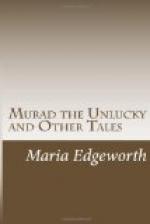The Irish haymaker now stepped forward, and, with a peculiar twist of the hips and shoulders, which those only who have seen it can picture to themselves, said, “Plase your honour’s honour, I have a little word to say too about the dog.”
“Say it, then,” said Mr. Marshal.
“Plase your honour, if I might expect to be forgiven, and let off for pulling down the jontleman’s stack, I might be able to tell him what I know about the dog.”
“If you can tell me anything about my dog,” said the tanner, “I will freely forgive you for pulling down the rick: especially as you have built it up again. Speak the truth, now: did not O’Neill make away with the dog?”
“Not at all, at all, plase your honour,” replied the haymaker: “and the truth of the matter is, I know nothing of the dog, good or bad; but I know something of his collar, if your name, plase your honour, is Hill, as I take it to be.”
“My name is Hill: proceed,” said the tanner, with great eagerness. “You know something about the collar of my dog Jowler?”
“Plase your honour, this much I know, any way, that it is now, or was the night before last, at the pawnbroker’s there, below in town; for, plase your honour, I was sent late at night (that night that Mr. O’Neill, long life to him! was arrested) to the pawnbroker’s for a Jew by Mrs. O’Neill, poor creature! She was in great trouble that same time.”
“Very likely,” interrupted Mr. Hill: “but go on to the collar; what of the collar?”
“She sent me—I’ll tell you the story, plase your honour, out of the face—she sent me to the pawnbroker’s for the Jew; and, it being so late at night, the shop was shut, and it was with all the trouble in life that I got into the house any way: and, when I got in, there was none but a slip of a boy up; and he set down the light that he had in his hand, and ran up the stairs to waken his master: and, whilst he was gone, I just made bold to look round at what sort of a place I was in, and at the old clothes and rags and scraps; there was a sort of a frieze trusty.”
“A trusty!” said Mr. Hill; “what is that, pray?”
“A big coat, sure, plase your honour: there was a frieze big coat lying in a corner, which I had my eye upon, to trate myself to: I having, as I then thought, money in my little purse enough for it. Well, I won’t trouble your honour’s honour with telling of you now how I lost my purse in the field, as I found after; but about the big coat—as I was saying, I just lifted it off the ground to see would it fit me; and, as I swung it round, something, plase your honour, hit me a great knock on the shins: it was in the pocket of the coat, whatever it was, I knew; so I looks into the pocket to see what was it, plase your honour, and out I pulls a hammer and a dog-collar: it was a wonder, both together, they did not break my shins entirely: but it’s no matter for my shins now; so, before the boy came down, I just out of idleness spelt out to myself the name that was upon the collar: there were two names, plase your honour, and out of the first there were so many letters hammered out I could make nothing of it at all, at all; but the other name was plain enough to read, any way, and it was Hill, plase your honour’s honour, as sure as life: Hill, now.”




